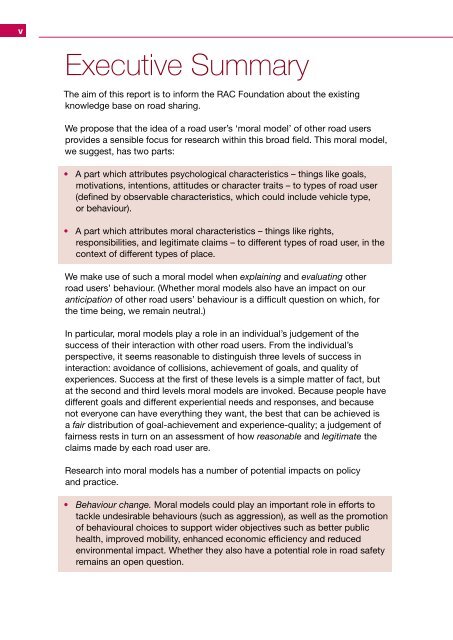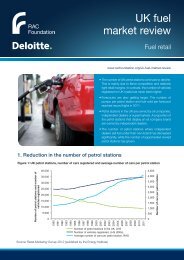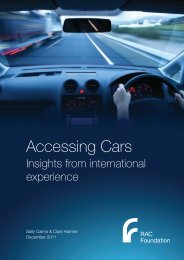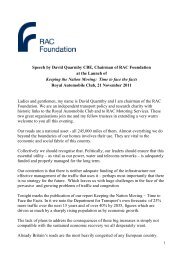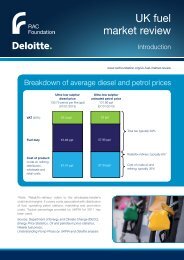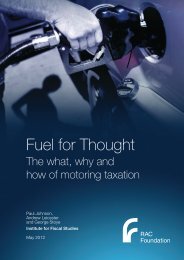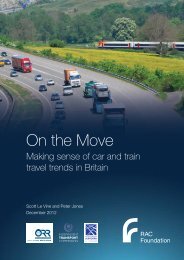Road sharing - does it matter what road users think of each other?
Road sharing - does it matter what road users think of each other?
Road sharing - does it matter what road users think of each other?
Create successful ePaper yourself
Turn your PDF publications into a flip-book with our unique Google optimized e-Paper software.
vExecutive SummaryThe aim <strong>of</strong> this report is to inform the RAC Foundation about the existingknowledge base on <strong>road</strong> <strong>sharing</strong>.We propose that the idea <strong>of</strong> a <strong>road</strong> user’s ‘moral model’ <strong>of</strong> <strong>other</strong> <strong>road</strong> <strong>users</strong>provides a sensible focus for research w<strong>it</strong>hin this b<strong>road</strong> field. This moral model,we suggest, has two parts:• A part which attributes psychological characteristics – things like goals,motivations, intentions, att<strong>it</strong>udes or character tra<strong>it</strong>s – to types <strong>of</strong> <strong>road</strong> user(defined by observable characteristics, which could include vehicle type,or behaviour).• A part which attributes moral characteristics – things like rights,responsibil<strong>it</strong>ies, and leg<strong>it</strong>imate claims – to different types <strong>of</strong> <strong>road</strong> user, in thecontext <strong>of</strong> different types <strong>of</strong> place.We make use <strong>of</strong> such a moral model when explaining and evaluating <strong>other</strong><strong>road</strong> <strong>users</strong>’ behaviour. (Whether moral models also have an impact on ouranticipation <strong>of</strong> <strong>other</strong> <strong>road</strong> <strong>users</strong>’ behaviour is a difficult question on which, forthe time being, we remain neutral.)In particular, moral models play a role in an individual’s judgement <strong>of</strong> thesuccess <strong>of</strong> their interaction w<strong>it</strong>h <strong>other</strong> <strong>road</strong> <strong>users</strong>. From the individual’sperspective, <strong>it</strong> seems reasonable to distinguish three levels <strong>of</strong> success ininteraction: avoidance <strong>of</strong> collisions, achievement <strong>of</strong> goals, and qual<strong>it</strong>y <strong>of</strong>experiences. Success at the first <strong>of</strong> these levels is a simple <strong>matter</strong> <strong>of</strong> fact, butat the second and third levels moral models are invoked. Because people havedifferent goals and different experiential needs and responses, and becausenot everyone can have everything they want, the best that can be achieved isa fair distribution <strong>of</strong> goal-achievement and experience-qual<strong>it</strong>y; a judgement <strong>of</strong>fairness rests in turn on an assessment <strong>of</strong> how reasonable and leg<strong>it</strong>imate theclaims made by <strong>each</strong> <strong>road</strong> user are.Research into moral models has a number <strong>of</strong> potential impacts on policyand practice.• Behaviour change. Moral models could play an important role in efforts totackle undesirable behaviours (such as aggression), as well as the promotion<strong>of</strong> behavioural choices to support wider objectives such as better publichealth, improved mobil<strong>it</strong>y, enhanced economic efficiency and reducedenvironmental impact. Whether they also have a potential role in <strong>road</strong> safetyremains an open question.


